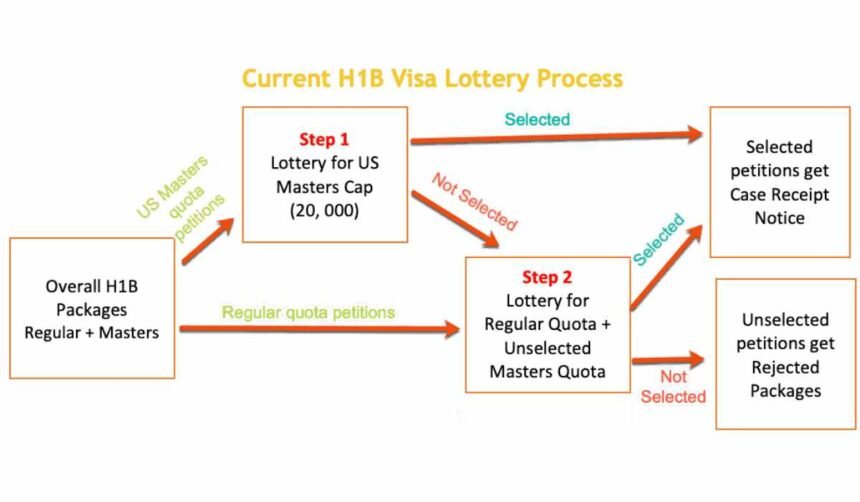U.S. immigration policy relies heavily on the H-1B visa cap and lottery system. These systems determine the annual cap on H-1B visas, which is in great demand because of the program’s ability to attract foreign employees with specialized skills.
This essay will go deeply into the H-1B visa cap and lottery system, exploring its origins, goals, and effects on foreign workers and the American economy.
The H-1B visa is a non-immigrant visa category in the United States, allowing U.S. firms to temporarily recruit foreign workers in high-skilled jobs. Jobs in IT, E&M, Healthcare, and the Financial Sector are typical examples of these types of industries.
The H-1B Visa Program
The Immigration Act of 1990 included the H-1B visa program, which was created in response to the need for professionals with specialized skills in the American economy. Since then, it has been crucial in boosting productivity, encouraging new ideas, and closing the skills gap in many fields.
Eligibility Criteria
To be eligible for an H-1B visa, foreign workers must meet specific criteria:
- Specialty Occupation: The job must require specialized knowledge and a minimum of a bachelor’s degree or its equivalent.
- Employer Sponsorship: A U.S. employer must sponsor the foreign worker by filing a petition with U.S. Citizenship and Immigration Services (USCIS).
- Labor Condition Application (LCA): The employer must also file an LCA with the Department of Labor (DOL), attesting to the payment of prevailing wages and adherence to labor laws.
- Numerical Limitations: The H-1B program is subject to an annual cap, which limits the number of visas available each fiscal year.
Also See: How Do I Qualify for an H-1B Visa?
The H-1B Visa Cap
The annual quota of H-1B visas awarded by the government is capped by the H-1B visa cap. To the best of my understanding, the annual cap was split between two buckets:
- Regular Cap: This cap allocated 65,000 H-1B visas for foreign workers with at least a bachelor’s degree.
- Master’s Cap: An additional 20,000 visas were reserved for foreign workers who had obtained a master’s degree or higher from a U.S. institution of higher education.
The H-1B Visa Lottery System
When the number of applicants for H-1B visas exceeds the quota, the United States government uses a lottery mechanism to pick the beneficiaries. This lottery system, which was first implemented in 1997, was designed to be random and fair.
The Lottery Process
The H-1B visa lottery typically unfolds in the following manner:
- Initial Filing Period: Employers submit their H-1B petitions during a specified filing window, usually in early April each year.
- Random Selection: If the number of petitions exceeds the cap within the filing period, USCIS conducts a random lottery to select the petitions that will be processed.
- Notification: Employers whose petitions are selected receive notification from USCIS, indicating that their petitions will be processed for further review.
- Rejected Petitions: Petitions not selected in the lottery are returned to the employers along with the filing fees.
- Processing and Approval: USCIS reviews the selected petitions, and if approved, the foreign workers are granted H-1B status.
Challenges and Controversies
There has been both support for and criticism of the H-1B visa cap and lottery method. Those in favor of the program point out that it helps American businesses hire foreign workers to fill critical positions in fields like healthcare and technology. It also helps the economy and spurs new ideas.
However, critics point to several issues:
- Inequity: The lottery system is seen as arbitrary, as it does not prioritize candidates based on their qualifications or the needs of U.S. employers.
- Dependency on Luck: Highly skilled individuals with critical skills may be denied visas simply due to the randomness of the lottery.
- Outsourcing: Some outsourcing companies have been accused of gaming the system to secure a disproportionate number of visas.
Also See: Understanding the Duration of an H-1B Visa: How Long Can You Stay in the United States
Reforms and Proposed Changes
Several proposals have been made over the years to modify the H-1B visa program, with a focus on the cap and lottery mechanism. Concerns over program integrity, compensation levels, and the prioritizing of highly skilled personnel have inspired proposed adjustments.
Conclusion
When it comes to immigration to the United States, the H-1B visa cap and lottery system play a crucial role by allowing highly talented foreign workers to enter the American labor force.
Despite their usefulness in alleviating labor shortages and encouraging creativity, they have been criticized for being too dependent on chance.
To attract global talent while also guaranteeing justice and openness in the visa allocation process is crucial, as evidenced by the ongoing discussion around the H-1B program.



